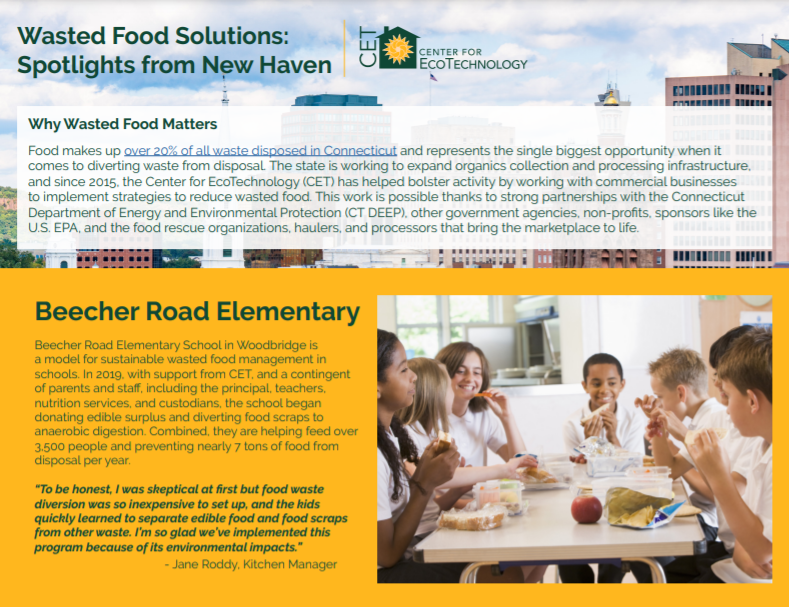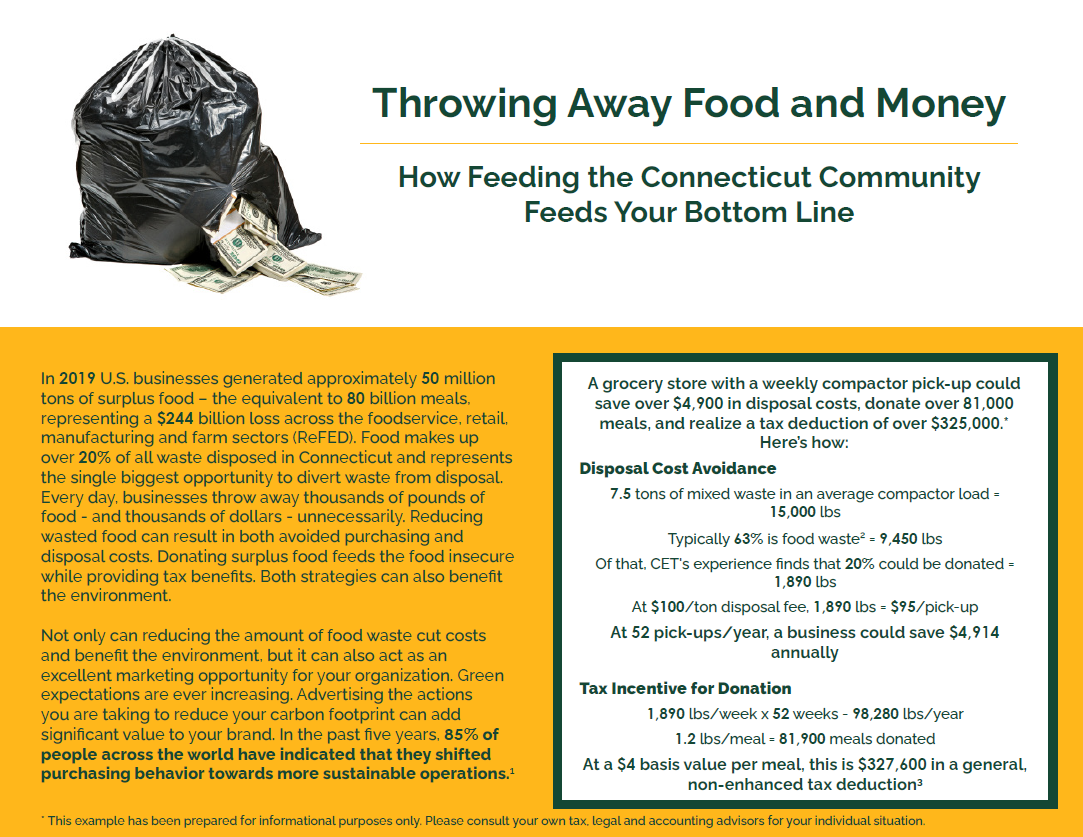CET offers comprehensive recycling assistance to Connecticut businesses. Click here to learn more. Find resources specific to wasted food below.
CET has helped many businesses and institutions in Connecticut learn more about food recovery and wasted food diversion opportunities. When it comes to preventing and diverting a wide range of materials from disposal, we can offer no-cost support! We help a range of businesses, from those that are just getting started to those who want to take their existing efforts to the next level.
Whether you’re looking to reduce wasted food, or just your waste in general, we can help.
Helpful Connecticut Wasted Food Resources
- Connecticut Food Waste Estimation Guidance
- CET has compiled industry data from published reports and studies, which can be used as guidance for facilities with little to no current Source Separated Organic Materials (SSOM) diversion program in place. The purpose of this tool is to help businesses and institutions in Connecticut determine whether it is likely they are subject to the Connecticut Commercial Organics Recycling Law.
- Wasted food reduction and recovery in Connecticut
- Connecticut DEEP’s resources on how to recover food and reduce wasted food.
- Map of Food Waste in Connecticut
- Connecticut DEEP’s map for identifying, quantifying, and mapping wasted food from Connecticut businesses and institutions.
- Composting and Anaerobic Digestion Facilities in Connecticut
- Connecticut DEEP’s website includes facilities that accept certain types of wasted food.
- Connecticut Food Donation Made Easy
- This food rescue guidance document is part of a series aimed at helping commercial food service providers – e.g., restaurants, hotels, corporate cafeterias, and schools – reduce the volume of organic waste they send to landfills.
- Food Donation by Connecticut Schools Guidelines and Resources
- CET, in collaboration with Connecticut Department of Energy and Environmental Protection, Department of Public Health, Department of Education, Department of Agriculture, and others, developed a guidance document for Connecticut schools on opportunities to donate food internally through share tables as well as externally to food banks and charitable organizations. The document consolidates federal and state regulations, including information on liability protection, health codes, and more.
- Food Scraps Diversion Guide for West Hartford Public Schools
- CET provides guidance on how to implement a district-wide food scraps diversion program.
- How to donate food to the Connecticut Food Bank
- The Connecticut Food Bank provides guidance on how to donate food (in Fairfield, Litchfield, Middlesex, New Haven, New London, and Windham counties).
- Throwing Away Food and Money: How Feeding the Connecticut Community Feeds Your Bottom Line
-
CET developed a resource for Connecticut businesses interested in learning more about the potential financial savings from preventing food waste. This document includes success stories, a baseline formula, and more.
-
- How to donate food to Connecticut Foodshare
- Connecticut Foodshare provides both pick-up and drop-off services for food donation (Hartford and Tolland counties).
- Kneads Bakery, Café, and Mill Case Study
- Kneads Bakery, Café, and Mill received assistance from the Center for EcoTechnology in finding solutions to reduce their waste. Their efforts led to cost savings and reduced overall waste.
- Food Rescue US
- Food Rescue US is committed to reducing food waste and food insecurity in America. Using a web-based app, they engage volunteers to transfer excess fresh food from grocers, restaurants, and other sources, to social service agencies that feed people who are food insecure.
- Haven’s Harvest
- Businesses often have excess food and business owners struggle to find community partners to accept the food and find transportation for that food. That is where Haven’s Harvest comes in. Creating a robust community network is necessary to direct the food to people rather than letting the food go to waste.
- How the University of New Haven Reduced Food Waste and Expenses
- The University has a robust set of programs in place to reduce the amount of wasted food. Thanks to the campus’s sustainability efforts, including food donation and source separation of food scraps for composting, the University is saving over $10,000 per year. While it had excellent foundations for material management on campus, the University contacted CET for support with food waste, recycling, and trash collections and communication.
Stories to Inspire
Share these stories! Check out our Social Media Toolkit for business-specific captions.
The Sheraton Hotel at Bradley International Airport reached out to CET for help diverting their food waste by composting. This enabled them to reduce their waste pickups from 4 times a week to 1 time a week!
In 2016, a class project at Middlebrook Middle School inspired their cafeteria’s food waste diversion program and transformed the Wilton School District.
Through support from Middletown Sanitation Department, the EPA, and CT DEEP, the Center for EcoTechnology put together this instructional video with Blue Earth Compost and their customer Perk on Main to help other restaurants set up and operate successful food scrap diversion programs for anaerobic digestion. By participating in this innovative program, businesses reduce trash generation, support local jobs, and help create energy and compost.
Kneads Bakery, Café, and Mill received assistance from the Center for EcoTechnology in finding solutions to reduce their waste. Their efforts led to cost savings and reduced overall waste.
Connecticut Legal & Regulatory Requirements
- Every state has specific state-level legal and regulatory requirements regarding food waste and food donation. ReFED, a national food waste prevention nonprofit, created a searchable database of state-by-state food waste policies and regulations, in collaboration with the Harvard Food Law and Policy Clinic. View the Connecticut food waste policy page for specific, up-to-date information about Connecticut’s food waste laws.
- The Emerson Act
- The Federal Emerson Act (Public Law 104-210) protects donors from liability when donating to nonprofit organizations and protects donors from civil and criminal liability should the product, donated in good faith, later cause harm to the needy recipient.
- Helpful fact sheets on food donation laws from Harvard Food Law and Policy Clinic
In the Press:
-
Connecticut wastes too much food, but help is on the way– News 8
-
Connecticut using fed funds for projects to curb food waste– New Haven Register
-
Grants aim to reduce food waste– Journal Inquirer
-
Middlebrook School focuses on food donations in cafeteria– The Hour
-
Zero Waste Connecticut Schools Coalition Forming– Patch News
-
First Zero Waste meeting draws 50– Wilton Bulletin

